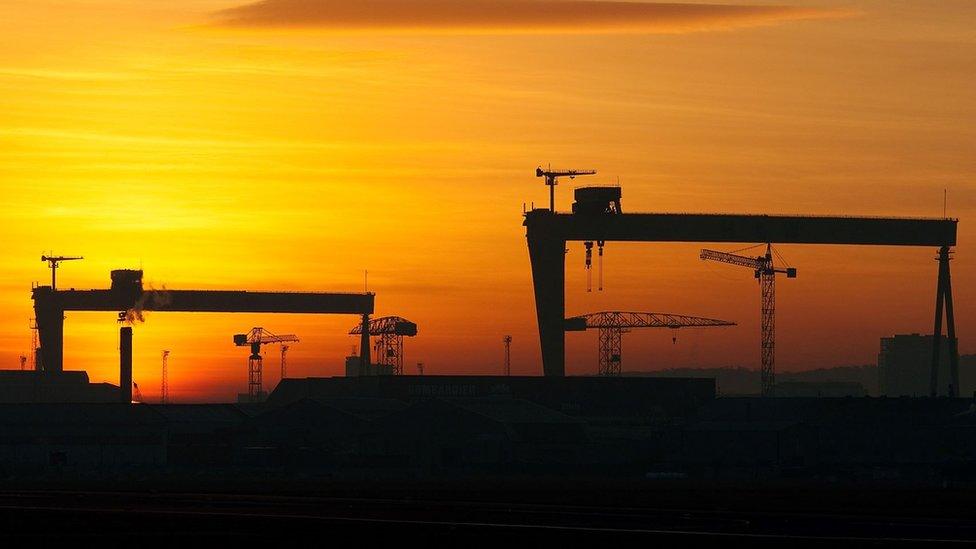Brexit: Protocol deal no guarantee of Stormont return, says Irish PM
- Published
- comments
I have never used threats of violence, says Irish PM
There is no guarantee that a deal on the Northern Ireland Protocol would lead to the re-establishment of the Stormont Executive, Taoiseach (Irish PM) Leo Varadkar has said.
Mr Varadkar was in Belfast on Thursday for meetings with Stormont's main parties.
Talks continue between the UK and the EU to find a resolution on the protocol.
However, Mr Varadkar said "it's not a given" it would restore power-sharing.
Northern Ireland's ruling executive of ministers has not met since February 2022 when Paul Givan, of the Democratic Unionist Party (DUP), resigned as first minister as part of the party's protest against the Northern Ireland Protocol.
The protocol is part of the Brexit deal agreed between the UK government and the EU.
Designed to ensure free trade could continue across the Irish border, it has led to additional checks on some goods moving between Great Britain and Northern Ireland, sparking protests by unionists and the collapse of the executive.
'Restore relations'
On Thursday, Mr Varadkar said its implementation "was too strict and too rigid and that created real difficulties".
Making his first visit to Northern Ireland since becoming taoiseach again in December, he added: "I'm totally of the view that we can work together to make changes that are necessary that can get us back to a very low number of checks.
"I'd like to get to the point where we can agree on something that works for everyone and can work on a cross community basis."
Mr Varadkar said he was keen to "repair and restore" relations with political parties in Northern Ireland, and also relations with the UK government, which he said had become strained because of Brexit.
Speaking after his meeting with the taoiseach, DUP leader Sir Jeffrey Donaldson said Mr Varadkar now had "a better understanding of the difficulties that the protocol is creating for Northern Ireland".
"We covered a wide range of issues, not least the protocol and not least the need to ensure we get a solution that both unionists and nationalists can support," he said.
"A deal that works for everyone has to be the way forward and that has to address the very genuine, real, concerns that unionists have about the harm the protocol is doing to Northern Ireland."
Mr Varadkar said while a protocol deal could "un-lock" the possibility of re-establishing the executive, "it's not a guarantee".
"It will still be of value in its own right but obviously our desire is that we should have the first thing happen which is an agreement on the protocol then unlocking the restoration of the assembly and the executive, but it's not a given that one follows the other."
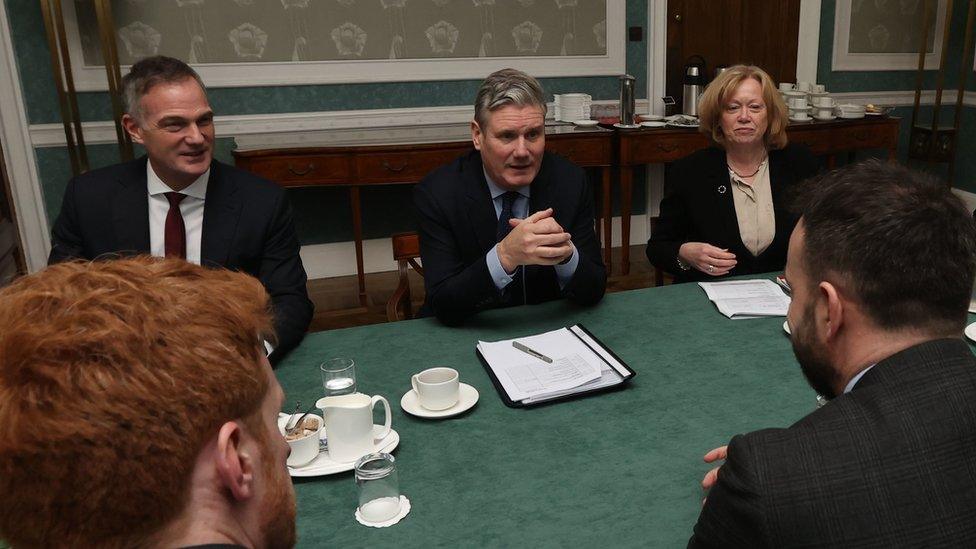
Sir Keir Starmer also held meetings with the main Stormont parties on Thursday
Sinn Féin President Mary Lou McDonald said with good will and good faith she believed "things could move actually quite quickly" on the protocol.
"This is a test of good will for all parties, it's a test certainly for the British government, who in the final analysis must take responsibility for the kind of stalemate that we have endured for the last eight months."
Labour leader Sir Keir Starmer has also been at Stormont to hold separate meetings with the parties, which he described as "constructive".
"Notwithstanding the challenges I do think there's a real window of opportunity for progress in relation to the protocol," he said.
"It's very important now that we seize that opportunity and do just that."
Tánaiste (Irish Deputy Prime Minister) and Foreign Affairs Minister Micheál Martin carried out a series of engagements in Northern Ireland, meeting Northern Ireland Secretary Chris Heaton-Harris at Hillsborough.
There are significant gaps that need to be resolved in discussions between the UK and the EU about the protocol, Downing Street has said.
Talks continue between the UK and the EU for a way forward on the protocol.
A spokesman for Prime Minister Rishi Sunak said the government would not be setting deadlines or timelines on negotiations, but added it wished to resolve the issues quickly.

Why is there a row over the protocol?
Part of the UK's Brexit deal with the EU, the protocol keeps Northern Ireland aligned with the EU's single market for goods, avoiding the need for a hard border with the Republic of Ireland after Brexit.
However, it also creates a new trade border between Northern Ireland and Great Britain, something the EU accepts is causing difficulties for many businesses.
Most politicians elected to the Stormont Assembly want the protocol to remain, but some unionists say it undermines Northern Ireland's place in the UK.

The UK government has argued the protocol is not working and plans to override most of the agreement if the EU does not agree to changes.
The government set in place a deadline of 19 January for the parties at Stormont to form a power-sharing executive.
But the DUP has said it will not do so until there are significant changes to the protocol.
The deadline, therefore, is highly unlikely to be met next week, which means Mr Heaton-Harris is expected to trigger another three-month period to allow the protocol negotiations to make progress.
Ulster Unionist Party leader Doug Beattie said the protocol negotiations were were being kept "tight" and that he did not see "much light coming out of them".
However, he added that he appreciated the opportunity to meet both the taoiseach and Labour leader Sir Keir Starmer.
Colum Eastwood, leader of the Social Democratic and Labour Party (SDLP), said it will be up to the DUP "to make a decision" and return ministers to the Northern Ireland Executive.
Alliance Party deputy leader Stephen Farry said there was urgency to find a resolution.
"We want to de-dramatise the current discussions around the protocol, this is fundamentally about getting something that works for Northern Ireland, in particular our business community," he explained.

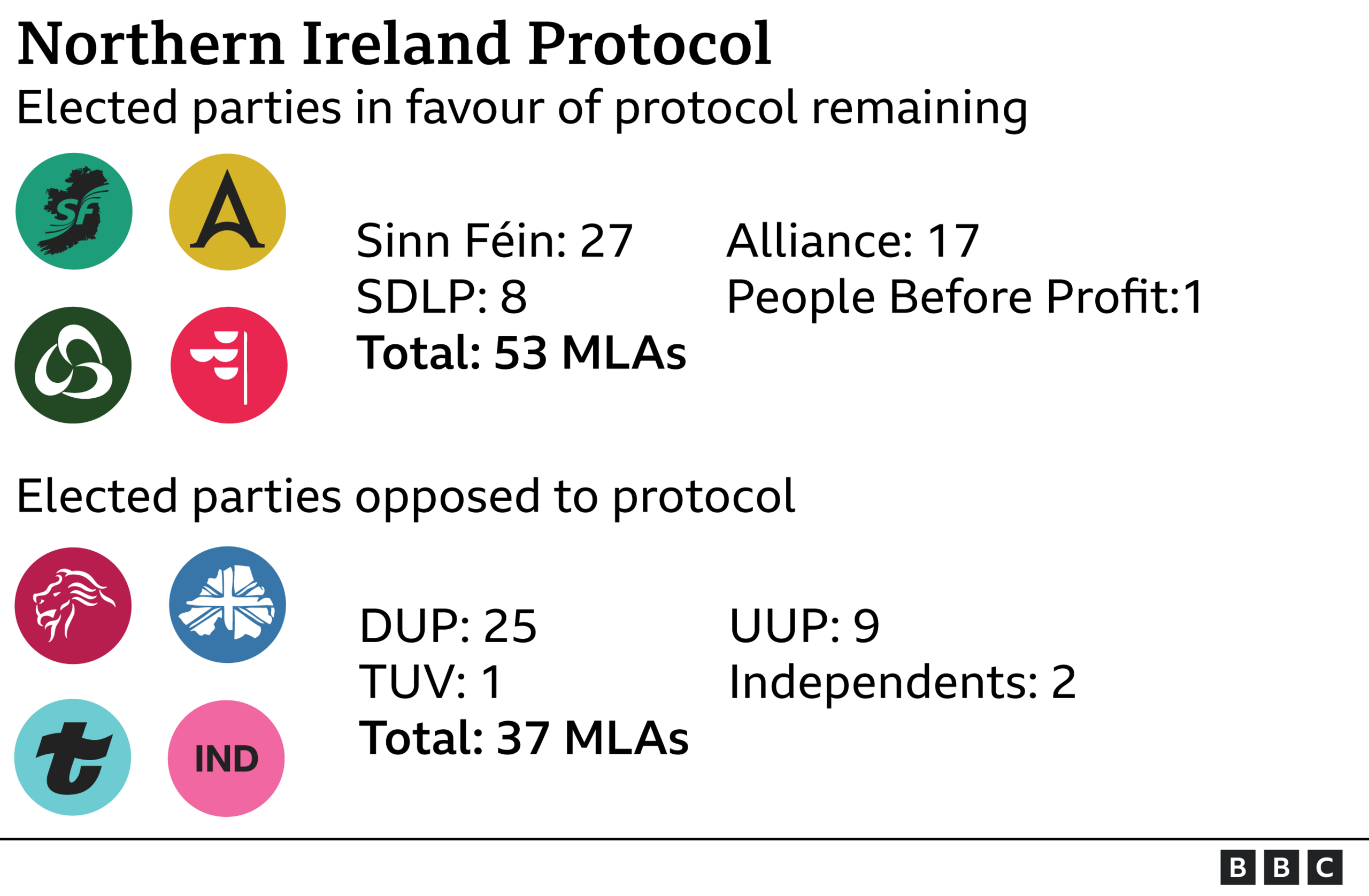
A majority of members of the Northern Ireland Assembly elected in May 2022 are in favour of the protocol, in some form, remaining.
Sinn Féin, Alliance and the SDLP have said improvements to the protocol are needed to ease its implementation.
Unionist politicians want it replaced with new arrangements.

During his visit, Mr Varadkar will meet the Northern Ireland Brexit Business working group, while Mr Martin will visit Armagh for the launch of a shared island civic society fund and meet victims and survivors of Troubles-related violence.
The Irish government said Thursday's high-level visits were a clear sign of its commitment to resolving the difficulties over the protocol and helping "ensure that the institutions of the Good Friday Agreement can once again operate effectively".
- Published11 January 2023
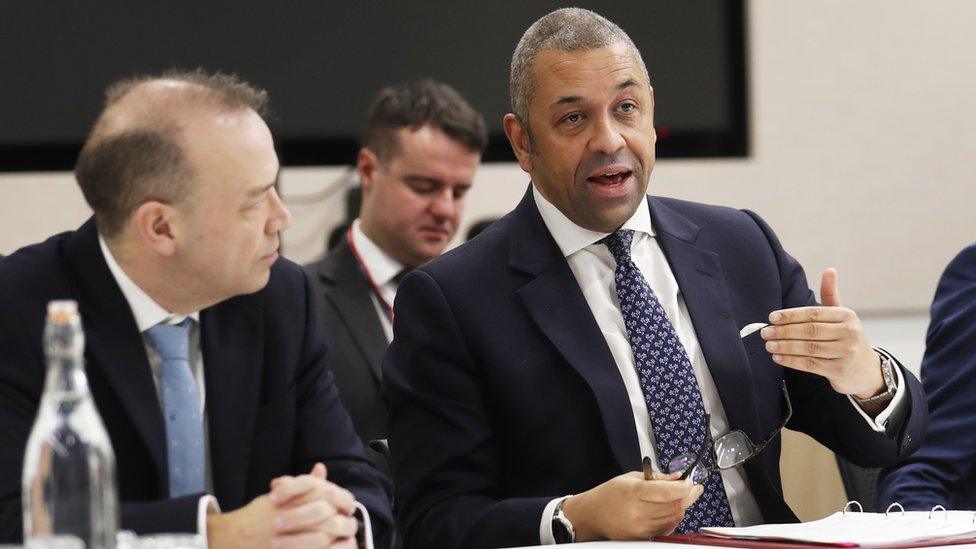
- Published2 February 2024

- Published9 January 2023
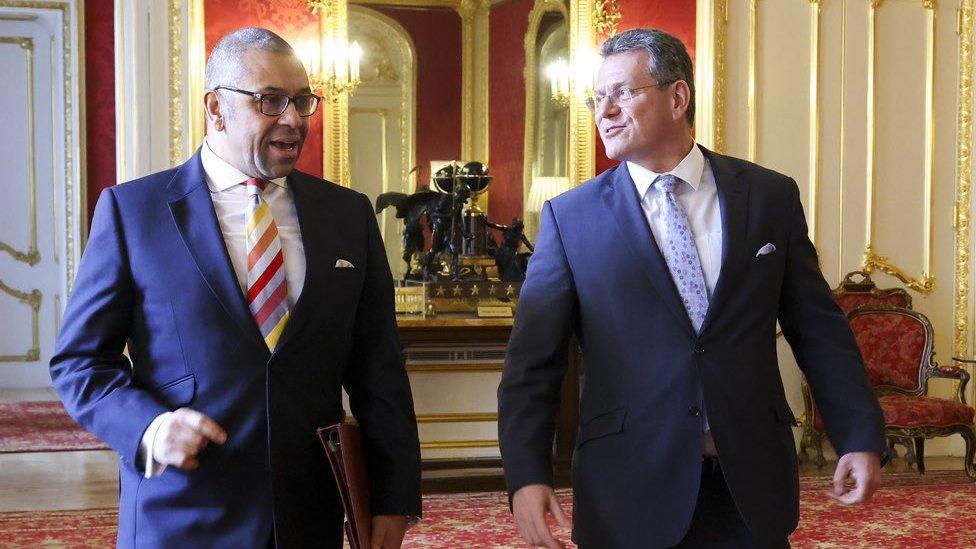
- Published28 December 2022
